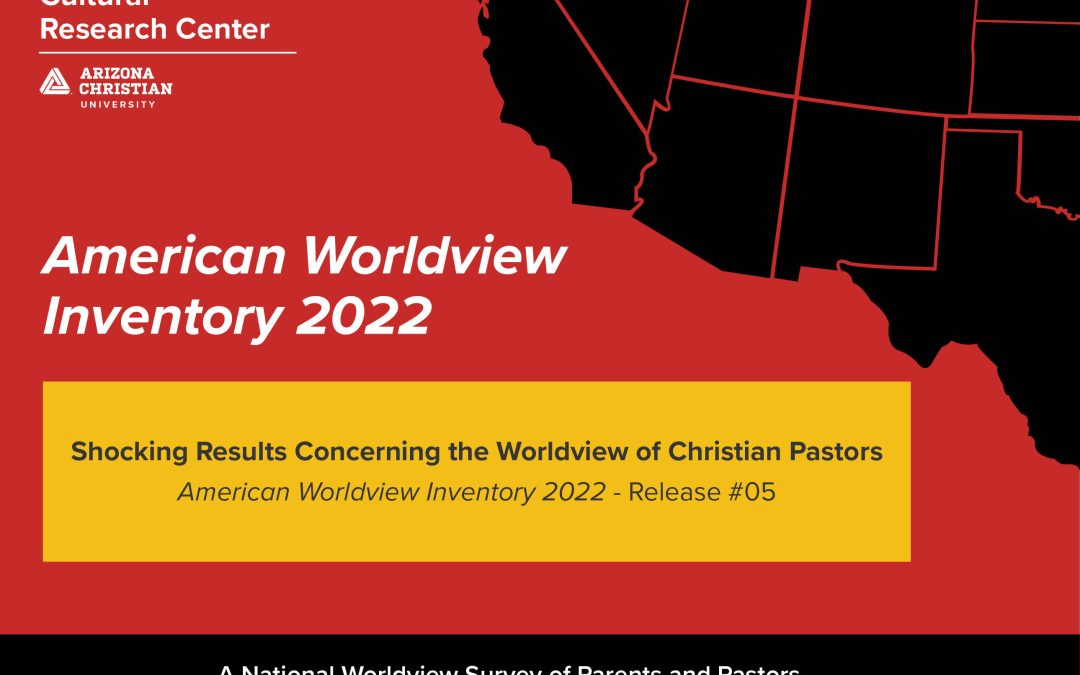By Dr. Tracy F. Munsil, Executive Director | May 12, 2022|CRC, American Worldview Inventory 2022
From the Cultural Research Center at Arizona Christian University
A new nationwide survey of America’s Christian pastors shows that a majority of pastors lack a biblical worldview. In fact, just slightly more than a third (37%) possess a biblical worldview and the majority—62%—hold a hybrid worldview known as Syncretism.
These shocking findings are part of the American Worldview Inventory 2022, conducted by the Cultural Research Center at Arizona Christian University and administered to Christian pastors to better understand the worldviews that drive their thinking and behavior.
As veteran researcher and CRC Director of Research George Barna explains, “It’s just further evidence that the culture is influencing the American church much more than Christian churches are influencing the culture.”
According to this latest report, the level of biblical worldview varies by the pastoral position held. Among Senior Pastors, for instance, 41% hold a biblical worldview—the highest incidence among any of the five pastoral positions studied. Next highest was the 28% among Associate Pastors.
One of the more concerning revelations emerging from the research is the worldview of pastors who work with young people, Barna noted. The study found that only 12% of Children’s and Youth Pastors hold a biblical worldview. And among Teaching Pastors, the level of biblical worldview is a mere 13%.
“A person’s worldview primarily develops before the age of 13, then goes through a period of refinement during their teens and twenties. Therefore, from a worldview development perspective, a church’s most important ministers are the Children’s Pastor and the Youth Pastor,” Barna said.
“Discovering that seven out of every eight of those pastors lack a biblical worldview helps to explain why so few among the nation’s youngest generations are developing a heart and mind for biblical principles and ways of life, and why our society seems to have run wild over the last decade,” Barna explained.
According to ACU President Len Munsil, the findings highlight that the biblical worldview crisis in America begins at the top.
“Our latest research shows this is stunning erosion of biblical understanding is present even among the leaders of the Church,” Munsil said. “We need a comprehensive strategy to rebuild biblical worldview into every generation and in every part of life,” Munsil said. “For ACU, this means strategically training our students to develop a biblical worldview through their academic curriculum, spiritual formation programs, and co-curricular activities. And through CRC, we continue to identify ways to build biblical worldview throughout the church, in families and throughout our culture.”
The latest report from the AWVI 2022 found that the prevailing worldview among pastors is best described as Syncretism, the blending of ideas and applications from a variety of holistic worldviews into a unique but inconsistent combination that represents their personal preferences.
More than six of every 10 pastors (62%) hold a syncretistic worldview. This trend is also being seen more widely in American culture, with almost nine out of 10 U.S. adults (88%) embracing Syncretism as their primary worldview, according to a report from last year’s study of competing worldviews in the American Worldview Inventory 2021.
According to the latest release, pastors have a biblical worldview in only one of eight worldview categories measured. Overall, 57% of all pastors think and act in consistently biblical ways regarding the purpose of life and their calling.
Leading the way in biblical understanding of life purpose and calling is Senior Pastors, among whom 60% are consistently biblical. A minority of the other four pastoral segments hold a biblical worldview in this area—48% of children’s and youth pastors, 41% of Associate Pastors, 36% of Teaching Pastors, and 27% of Executive Pastors.
A minority of all Christian pastors thinks and acts biblically in each of the other seven categories of worldview measurement. Specifically, only 47% have a biblical worldview regarding family and the value of life; 44% concerning issues related to God, creation, and history; 43% in relation to personal faith practices; 43% when it comes to matters of sin, salvation, and one’s relationship with God; 40% pertaining to human character and human nature; and 40% when it comes to measures of lifestyle, personal behavior, and relationships.
Lowest of all is a category that might have been expected to top the list: beliefs and behaviors related to the Bible, truth, and morality. Only 39% of all pastors have a biblical worldview in this area.
Barna offered a note of hope in spite of the data. “You cannot fix something unless you know it’s broken,” he commented. “Other recent research we have conducted suggests most pastors believe that they are theologically in tune with the Bible. Perhaps these findings will cause many of them to take a careful look at how well their beliefs and behavior conform to biblical principles and commands.”
As Barna noted, “It certainly seems that if America is going to experience a spiritual revival, that awakening is needed just as desperately in our pulpits as in the pews.”
The AWVI 022 Release #05: “Shocking Results Concerning the Worldview of Christian Pastors,” is available here.

